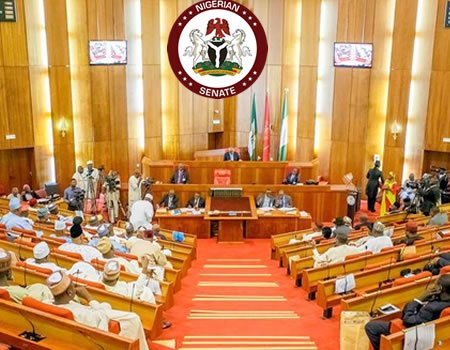The Senate on Tuesday directed its Committees on Foreign Affairs and Trade and Investment to liaise with the Ministry of Foreign Affairs to determine the status of over 600 Nigerian shops and businesses in Ghana alleged shut down by that authorities in that country.
The Ghana Union of Traders Association (GUTA) had on December 2 allegedly shut down shops and business premises belonging to Nigerians in the country.
The move by the Senate followed a motion sponsored by Senator Ifeanyi Ubah (YPP Anambra), titled: “The need to investigate alleged ill-treatment and injustices suffered by Nigerian traders and business owners in Ghana”.
In his remarks, Senate President, Ahmad Lawan, said it was the responsibility of the government to seek the protection of its citizens wherever they may reside.
He said the time has come for Nigeria to engage the Ghanaian authorities to find out what the actual situation was and to proffer lasting solutions.
Ubah in his lead debate decried the alleged ill-treatment against Nigerian traders and business owners in the neighbouring West African country.
He noted that as at the end of 2010, Nigerian businesses accounted for 60 percent of foreign investments in Ghana from the African continent.
He lamented that the once flourishing economic relations between Nigeria and Ghana had come under repeated threats as a result of the recent hostile posture of the Ghanaian authorities and indigenous Ghanaians Traders Union toward Nigerian traders.
He described the development as worrisome since “Ghana and Nigeria, as members of ECOWAS, have reciprocal obligations under the ECOWAS Protocol to their respective citizens to reside and do business within their territories without molestation.”
He said that Ghana had adopted discriminatory legislation aimed at frustrating Nigerian traders such as the passage of the Ghana Investment Promotion Commission Act 865 (GIPC).
READ ALSO: Nigeria Is Not A Dumping Ground For Other African Countries – FG
He said the act raised the amount of money for registering businesses by foreigners (mostly Nigerians) in Ghana to $200,000.
He said the Act further prohibited foreigners from trading in particular markets.
He said the GIPC Act 865 of 2013 also prohibited ECOWAS citizens from engaging in small and medium scale enterprises (SMEs) with a further prohibition on the registration of SMEs by foreigners.
Ubah also said Nigeria citizens were being frustrated from registering businesses given obstacles placed on genuine Nigerian entrepreneurs.
According to him, one of the obstacles was the requirement of proof of importation of $I million into Ghana.
This, he said was previously applicable to citizens of Non-ECOWAS member states such as China, India among others.
He said Nigeria and Ghana had previously set up a Joint Task Force from the Trade Ministries of both countries to inspect business facilities of companies registered under the ECOWAS Trade Liberalization Scheme (ETLS) in both countries.
He said both nations had also organised an economic submit in Accra in 2010 to address the dangers of threats to the business interests of Nigerians in Ghana.
He, however, regretted that the measures and the protection offered Nigerian traders under the ECOWAS framework had failed to address the incessant threats to Nigerian businesses in Ghana.
He insisted that unless the Senate intervenes, the situation may deteriorate into a serious diplomatic and economic row.
Fuse ODG Begs Ghanaian DJ’s To Stop Playing Nigerian Songs (Photo)
He said the complaints of affected Nigerian traders and business owners are yet to receive the deserved attention by appropriate authorities from the Federal Government despite repeated formal complaints.
Ubah argued that there was an urgent need to investigate the allegations and indeed draw the attention of the Federal Government and its relevant authorities to the unfortunate development.
Follow us on facebook
Post Disclaimer
The opinions, beliefs and viewpoints expressed by the author and forum participants on this website do not necessarily reflect the opinions, beliefs and viewpoints of Anaedo Online or official policies of the Anaedo Online.

